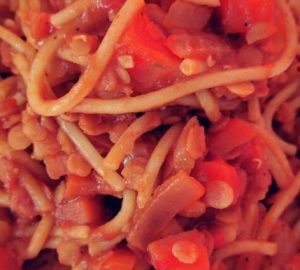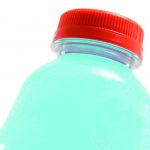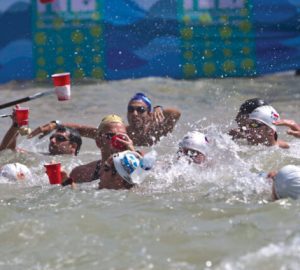Will Protein Make Me A Better Swimmer?
High protein diets have long been associated with strength based sports like rugby and power lifting, but recent studies reveal protein could play a bigger role in a swimmer’s training, nutrition and recovery than first thought, says Ross Edgley, a sports scientist at The Protein Works.
Protein is often called the building block of the body since it consists of combinations of structures called amino acids that combine in various ways to make muscles, bone, tendons and other tissues. Swimmers need protein primarily to repair and rebuild muscle that is broken down during exercise and to help optimize carbohydrate storage in the form of glycogen. But whilst The International Olympic Committee Consensus on Sports Nutrition states ‘the importance of protein for athletes has long been recognized’ (Ron. J.M. et al, 2004) until recently it wasn’t exactly known how much.
Firstly as a means of comparison, let’s examine the daily-suggested protein consumption for strength athletes. Again The International Olympic Committee Consensus on Sports Nutrition states ‘strength or speed athletes were recommended to consume 1.7grams of protein per kg of bodyweight per day.’ For a 100kg rugby player this equates to 170 grams of protein per day (usually broken down into 6 meals spaced roughly 2 hours apart throughout the day, each containing 28.33 grams of protein.)
Interestingly though, some experts are claiming endurance athletes (including swimmers) need more. In a study conducted at McMaster University in Ontario, Canada it was suggested ‘that endurance athletes require a greater intake of protein than either strength athletes or sedentary individuals to meet the needs of protein catabolism during exercise.’ (M. A. Tarnopolsky et al, 1999.) Put simply, this means because swimming training itself is so hard the body requires more protein to prevent it from entering into a catabolic state i.e. muscles begin to breakdown, the immune system is badly affected and injuries are more likely to occur. But if you ensure you have an adequate supply of protein and amino acids in your body, your muscles and tendons will have the essential nutrients they need to repair and recover, therefore ensuring you are fully able to continue training at a high intensity during your next training session.
So to make it more specific to swimming, based on Olympic Nutritional guidelines (1.7grams of protein per kg of bodyweight per day) an 80kg male swimmer, training 60-90 minutes per day, should be consuming 136 grams of protein (broken down into 6 meals spaced roughly 2 hours apart throughout the day, each containing 22.67grams of protein) to ensure his elevated nutritional needs are met due to intense training.
While consuming these levels of protein can be achieved through a balanced, healthy diet, some athletes find it more convenient to use protein supplements such as whey isolate.
References:
Short, S.H. and Short, W.R (1983) ‘Four-year study of university athletes’ dietary intake’ 1983 Jun;82(6):632-45.
M. A. Tarnopolsky, J. D. MacDougall, and S. A. Atkinson (1999) ‘Influence of protein intake and training status on nitrogen balance and lean body mass’ Journal of Applied Physiology
Economos, D.D. Bortz, S.S. Nelson, M.E (1993) ‘Nutritional practices of elite athletes. Practical recommendations.’ Journal of Sports Medicine 1993 Dec;16(6):381-99.
Paul GL. Dietary protein requirements of physically active individuals. Sports Med 1989; 8:154-176.
Boirie, Y., et al., “Slow and Fast Dietary Proteins Differently Modulate Post-Prandial Protein Accretion,” Proc Natl Acad Sci 94 (1997) : 14930-5.
Dangin, M., et al., “The Digestion Rate of Protein Is an Independent Regulating Factor of Post-Prandial Protein Retention,” Am J Physiol (Endocrinology & Metabolism) 280.2 (2001) : E340 -8.
Gambelunghe, C., et al., “Physical Exercise Intensity Can Be Related to Plasma Glutathione Levels,” J Physiol Biochem 57.2 (1997) : 9-14.
Kerksick, C., et al., “Effects of Whey Protein Supplementation with Casein or BCAA & Glutamine on Training Adaptations II: Performance,” Med Sci Sport Exer 35.5 (2003) : abstract 2204.
Kreider, R., et al., “Effects of Whey Protein Supplementation with Casein or BCAA & Glutamine on Training Adaptations I: Body Composition,” Med Sci Sport Exer 35.5 (2003) : abstract 2205.
Leeuwenburgh, C., and Li, L.L., “Glutathione Depletion in Rested and Exercised Mice: Biochemical Consequences and Adaptation,” Arch Biochem Biophys 316.22 (1995) : 941-9.
Leeuwenburgh, C., and Li, L.L., “Glutathione and Glutathione Ester Supplementation of Mice Alter Glutathione Homeostasis During Exercise,” J Nutr 128.12 (1998) : 2420-6.
Lemon, P.W.R., et al., “Protein Requirements and Muscle Mass/Strength Changes During Intensive Training in Novice Bodybuilders,” J Appl Physiol 73 (1992) : 767-7.
Lemon, P.W.R., “Effects of Exercise on Protein Metabolism. In Nutrition in Sport (Maughan, R.J. [ed.], Blackwell Science Ltd., 1257-65) 2000.
Sen, CK., et al., “Exercise-Induced Oxidative Stress: Glutathione Supplementation and Deficiency,” J Appl Physiol 77.5 (1994) : 2177-87.
Svensson, M.B., “Endogenous Antioxidants in Human Skeletal Muscle and Adaptation of Energy Metabolism: With Reference to Exercise—Training, Exercise Factors and Nutrition,” Ph.D. Thesis, Karolinska Institute, Sweden, 2003.
Tarnopolsky, M.A., et al., “Evaluation of Protein Requirements for Strength Trained Athletes,” J Appl Physiol 73 (1992) : 1986-95.
Ziemlanski, S., et al., “Balanced Intraintestinal Nutrition: Digestion, Absorption and Biological Value of Selected Preparations of Milk Proteins,” Acta Physiol Pol 29.6 (1978) : 543-56.
Yves Boirie, Martial Dangin, Pierre Gachon, Marie-Paule Vasson, Jean-Louis Maubois, and Bernard Beaufrère (1997) ‘Slow and fast dietary proteins differently modulate postprandial protein accretion’







